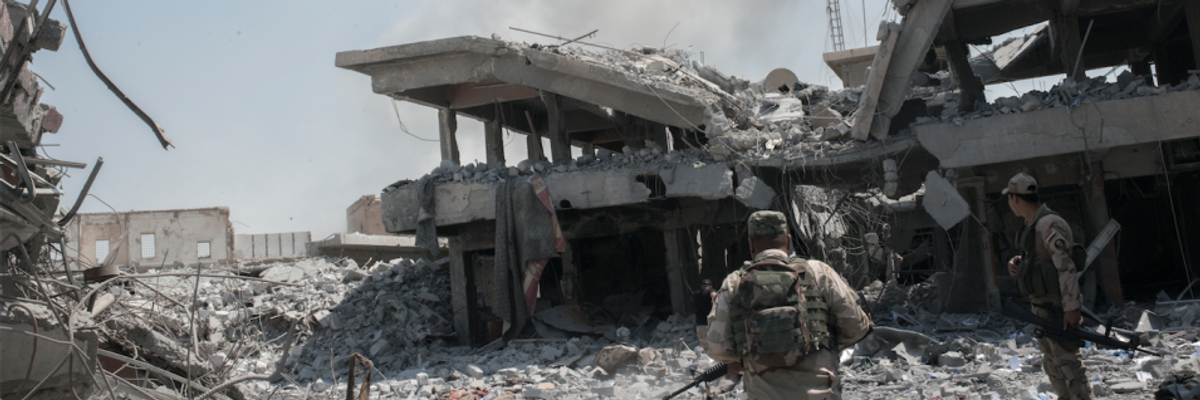
In a draft-less country, those of us not in or connected to our military are expected to say "thank you" to the warriors and otherwise go about our lives as if their wars (and the mayhem they continue to generate abroad) were not a fact of global life. (Photo: Martyn Aim/Getty Images)
And the Winners (in America's Wars) Are...
In the bipartisan style that these days usually applies only to the U.S. military, Congress has just settled on giving an extra $165 billion to the Pentagon.
When it comes to America's wars, more than 16 years later our generals are victorious. Not, of course, in the distant lands where those conflicts grind on unendingly, but in the one place that matters: Washington, D.C. Could there be a more striking sign of that than the elevation of three of those generals to key positions in the Trump administration? If any of them are going down any time soon, the wars this country has been conducting abroad won't be responsible, though one retired commander, John Kelly, now White House chief of staff, was wounded only last week fighting a rearguard action against the #MeToo movement.
If anything, recent weeks have offered remarkable evidence of just how victorious this country's losingest commanders and their colleagues really are in our nation's capital. In the bipartisan style that these days usually applies only to the U.S. military, Congress has just settled on giving an extra $165 billion to the Pentagon over the next two years as part of a formula for keeping the government open. As it happens, the 2017 Pentagon budget was already as large as the defense spending of the next seven nations combined. And that was before all those extra tens of billions of dollars ensured that the two-year military budget (for 2018 and 2019) would crest at a total of more than $1.4 trillion.
That's the sort of money that only goes to winners, not losers. And if this still seems a little strange to you, given that military's dismal record in actual war-fighting since 9/11, all I can say is: don't bring it up. It's no longer considered polite or proper to complain about our wars and those who fight them or how we fund them, not in an age when every American soldier is a "hero," which means that what they're doing from Afghanistan to Yemen, Syria to Somalia, must be heroic indeed.
In a draft-less country, those of us not in or connected to our military are expected to say "thank you" to the warriors and otherwise go about our lives as if their wars (and the mayhem they continue to generate abroad) were not a fact of global life. This is the definition of a demobilized public. If you happen to be that rarest of all creatures in our country these days -- someone in active opposition to those wars -- you have a problem. That means Stephanie Savell, who co-runs the Costs of War Project, which regularly provides well-researched and devastating information on the spread of those wars and the money continually being squandered on them, does indeed have a problem. It's one she understands all too well and describes vividly today.
Click here to read Stephanie Savell's "The Wars No One Notices."
An Urgent Message From Our Co-Founder
Dear Common Dreams reader, The U.S. is on a fast track to authoritarianism like nothing I've ever seen. Meanwhile, corporate news outlets are utterly capitulating to Trump, twisting their coverage to avoid drawing his ire while lining up to stuff cash in his pockets. That's why I believe that Common Dreams is doing the best and most consequential reporting that we've ever done. Our small but mighty team is a progressive reporting powerhouse, covering the news every day that the corporate media never will. Our mission has always been simple: To inform. To inspire. And to ignite change for the common good. Now here's the key piece that I want all our readers to understand: None of this would be possible without your financial support. That's not just some fundraising cliche. It's the absolute and literal truth. We don't accept corporate advertising and never will. We don't have a paywall because we don't think people should be blocked from critical news based on their ability to pay. Everything we do is funded by the donations of readers like you. Will you donate now to help power the nonprofit, independent reporting of Common Dreams? Thank you for being a vital member of our community. Together, we can keep independent journalism alive when it’s needed most. - Craig Brown, Co-founder |
When it comes to America's wars, more than 16 years later our generals are victorious. Not, of course, in the distant lands where those conflicts grind on unendingly, but in the one place that matters: Washington, D.C. Could there be a more striking sign of that than the elevation of three of those generals to key positions in the Trump administration? If any of them are going down any time soon, the wars this country has been conducting abroad won't be responsible, though one retired commander, John Kelly, now White House chief of staff, was wounded only last week fighting a rearguard action against the #MeToo movement.
If anything, recent weeks have offered remarkable evidence of just how victorious this country's losingest commanders and their colleagues really are in our nation's capital. In the bipartisan style that these days usually applies only to the U.S. military, Congress has just settled on giving an extra $165 billion to the Pentagon over the next two years as part of a formula for keeping the government open. As it happens, the 2017 Pentagon budget was already as large as the defense spending of the next seven nations combined. And that was before all those extra tens of billions of dollars ensured that the two-year military budget (for 2018 and 2019) would crest at a total of more than $1.4 trillion.
That's the sort of money that only goes to winners, not losers. And if this still seems a little strange to you, given that military's dismal record in actual war-fighting since 9/11, all I can say is: don't bring it up. It's no longer considered polite or proper to complain about our wars and those who fight them or how we fund them, not in an age when every American soldier is a "hero," which means that what they're doing from Afghanistan to Yemen, Syria to Somalia, must be heroic indeed.
In a draft-less country, those of us not in or connected to our military are expected to say "thank you" to the warriors and otherwise go about our lives as if their wars (and the mayhem they continue to generate abroad) were not a fact of global life. This is the definition of a demobilized public. If you happen to be that rarest of all creatures in our country these days -- someone in active opposition to those wars -- you have a problem. That means Stephanie Savell, who co-runs the Costs of War Project, which regularly provides well-researched and devastating information on the spread of those wars and the money continually being squandered on them, does indeed have a problem. It's one she understands all too well and describes vividly today.
Click here to read Stephanie Savell's "The Wars No One Notices."
When it comes to America's wars, more than 16 years later our generals are victorious. Not, of course, in the distant lands where those conflicts grind on unendingly, but in the one place that matters: Washington, D.C. Could there be a more striking sign of that than the elevation of three of those generals to key positions in the Trump administration? If any of them are going down any time soon, the wars this country has been conducting abroad won't be responsible, though one retired commander, John Kelly, now White House chief of staff, was wounded only last week fighting a rearguard action against the #MeToo movement.
If anything, recent weeks have offered remarkable evidence of just how victorious this country's losingest commanders and their colleagues really are in our nation's capital. In the bipartisan style that these days usually applies only to the U.S. military, Congress has just settled on giving an extra $165 billion to the Pentagon over the next two years as part of a formula for keeping the government open. As it happens, the 2017 Pentagon budget was already as large as the defense spending of the next seven nations combined. And that was before all those extra tens of billions of dollars ensured that the two-year military budget (for 2018 and 2019) would crest at a total of more than $1.4 trillion.
That's the sort of money that only goes to winners, not losers. And if this still seems a little strange to you, given that military's dismal record in actual war-fighting since 9/11, all I can say is: don't bring it up. It's no longer considered polite or proper to complain about our wars and those who fight them or how we fund them, not in an age when every American soldier is a "hero," which means that what they're doing from Afghanistan to Yemen, Syria to Somalia, must be heroic indeed.
In a draft-less country, those of us not in or connected to our military are expected to say "thank you" to the warriors and otherwise go about our lives as if their wars (and the mayhem they continue to generate abroad) were not a fact of global life. This is the definition of a demobilized public. If you happen to be that rarest of all creatures in our country these days -- someone in active opposition to those wars -- you have a problem. That means Stephanie Savell, who co-runs the Costs of War Project, which regularly provides well-researched and devastating information on the spread of those wars and the money continually being squandered on them, does indeed have a problem. It's one she understands all too well and describes vividly today.
Click here to read Stephanie Savell's "The Wars No One Notices."

